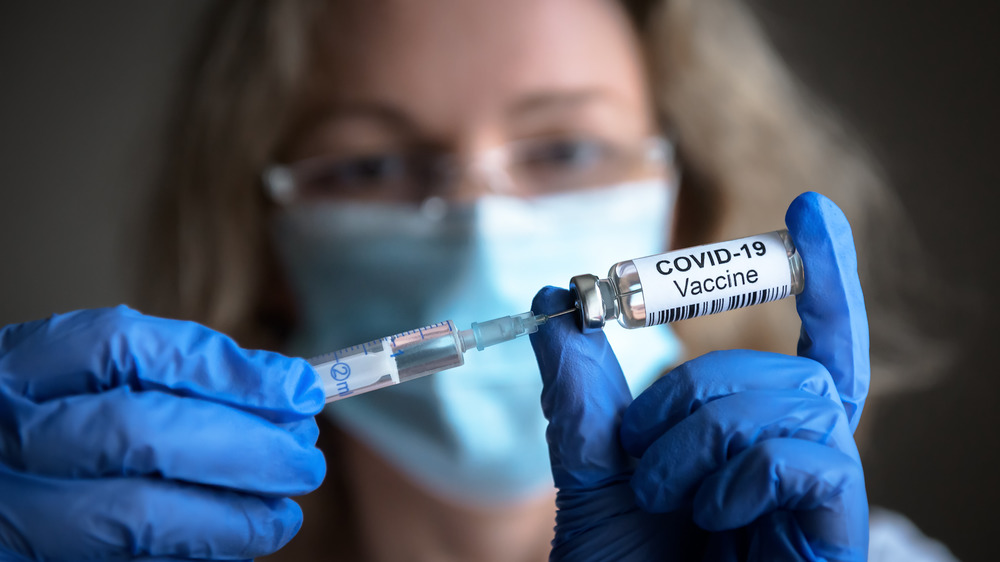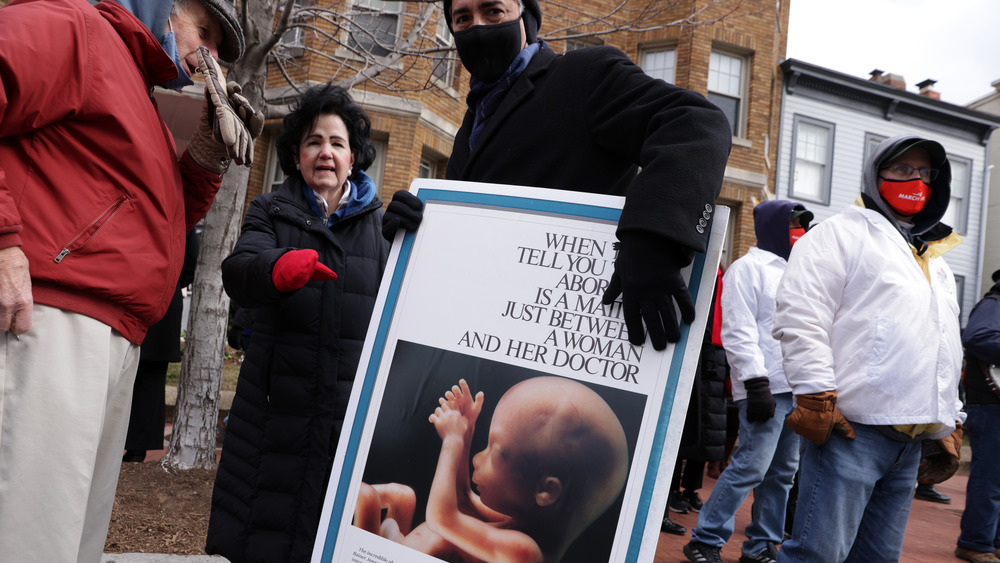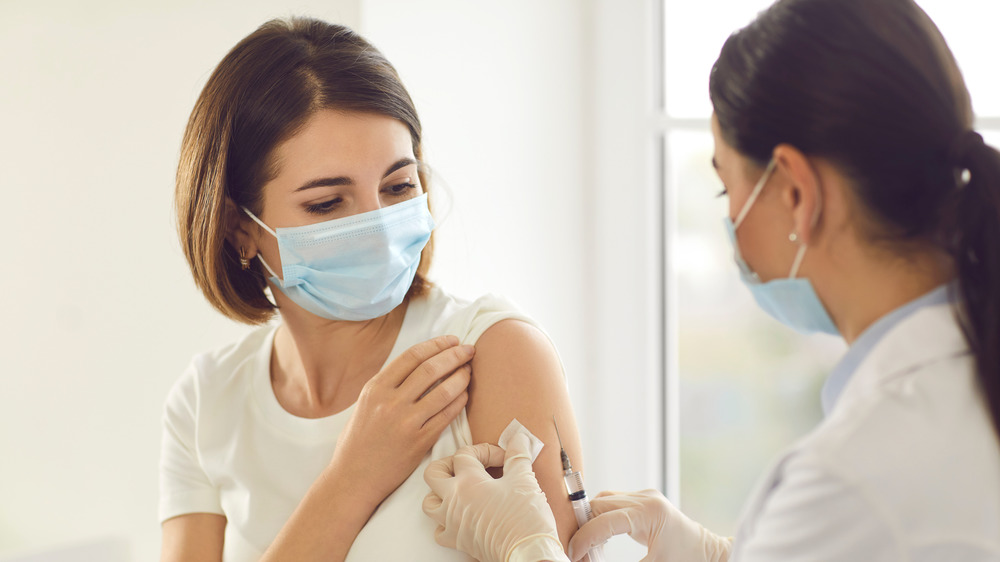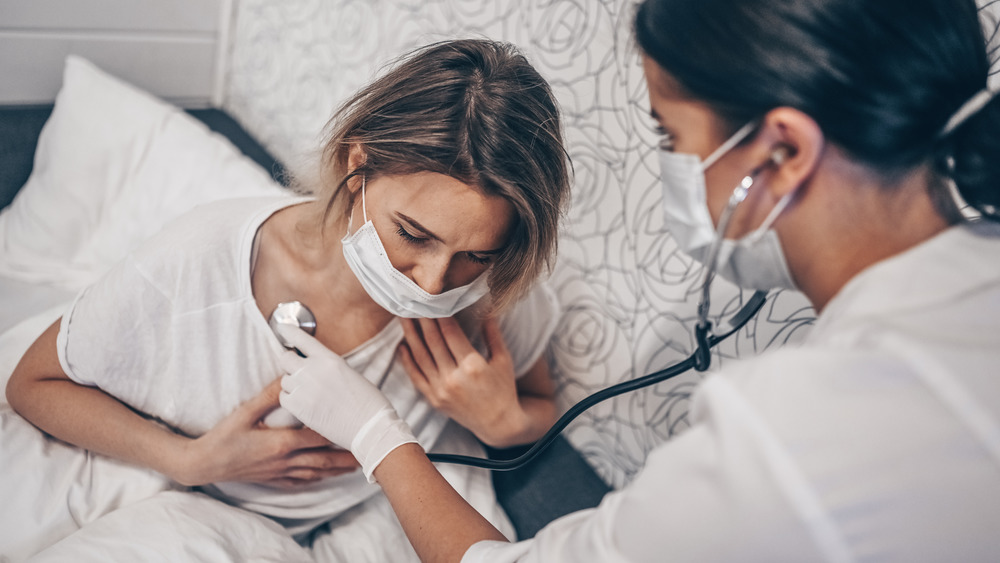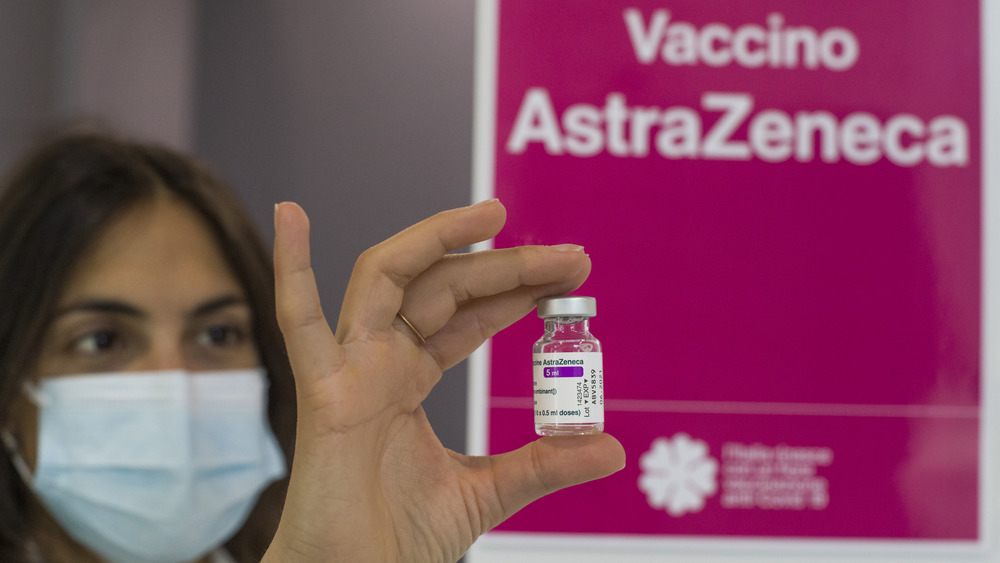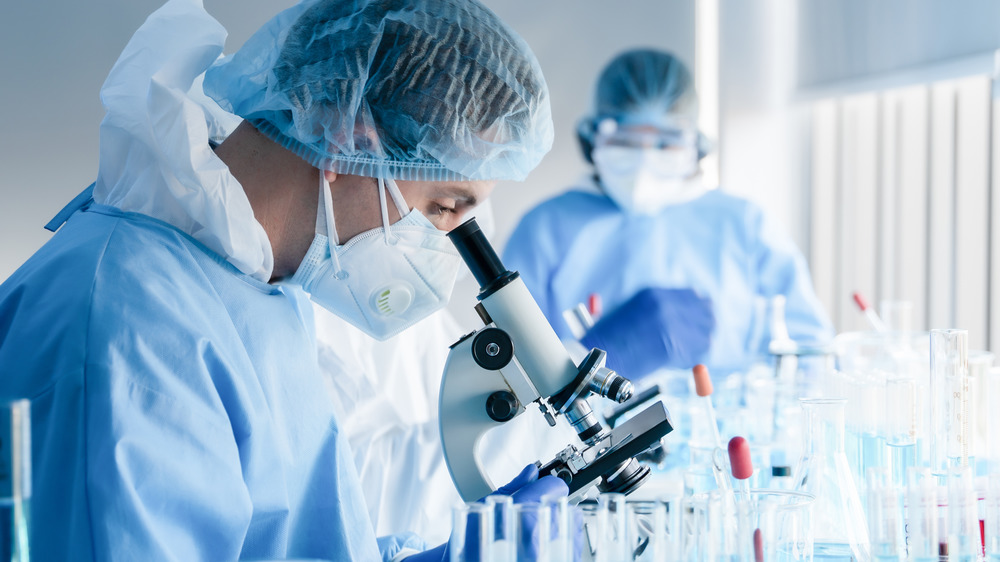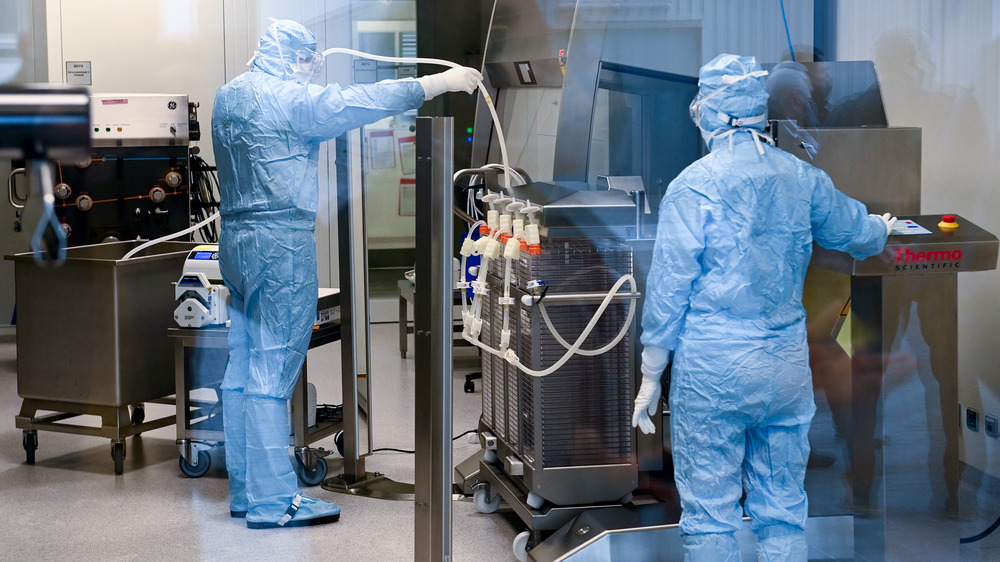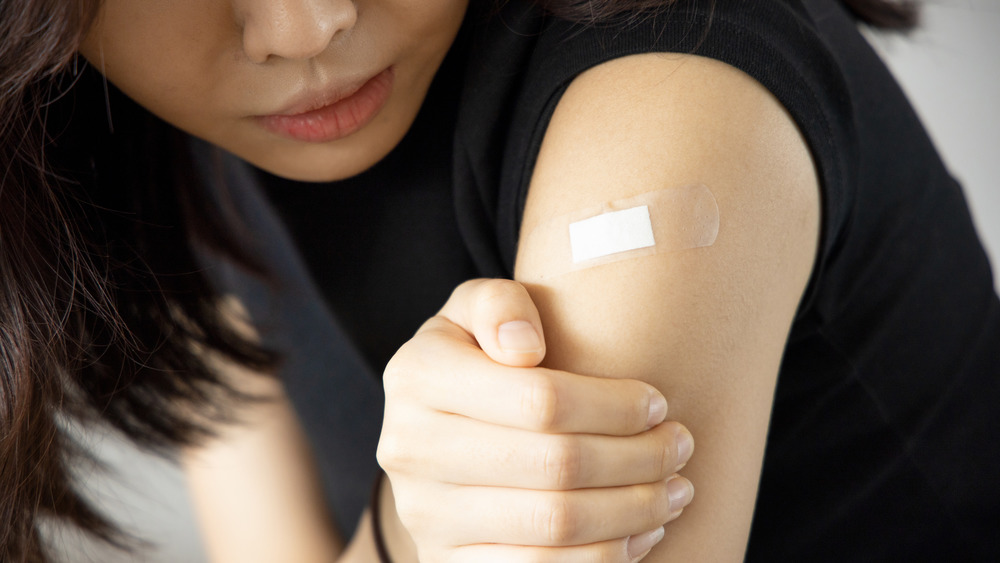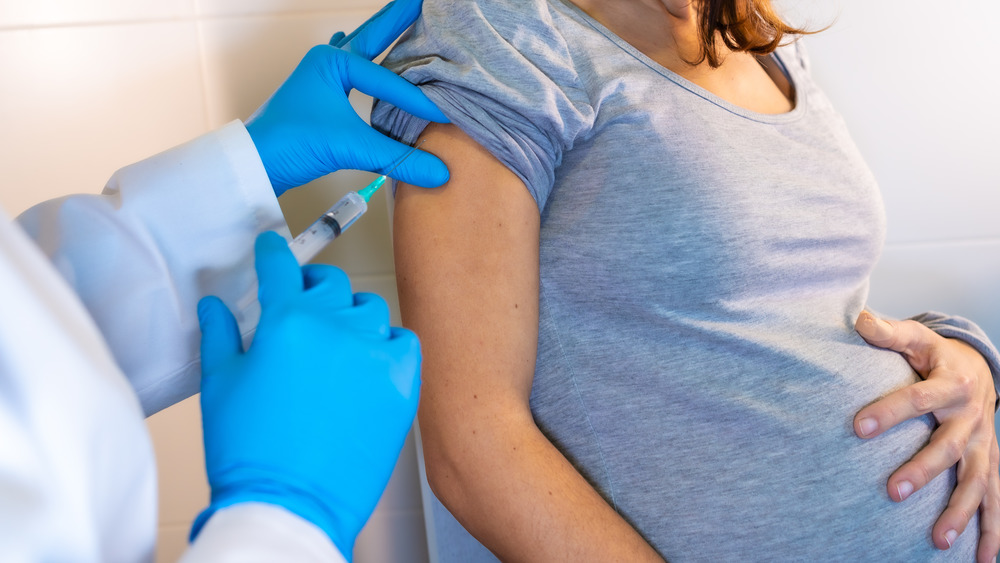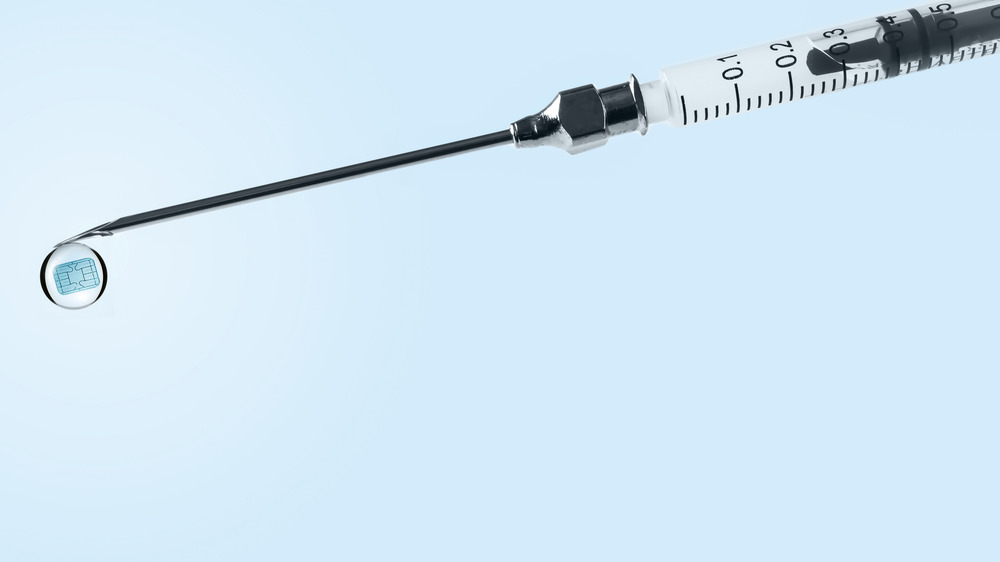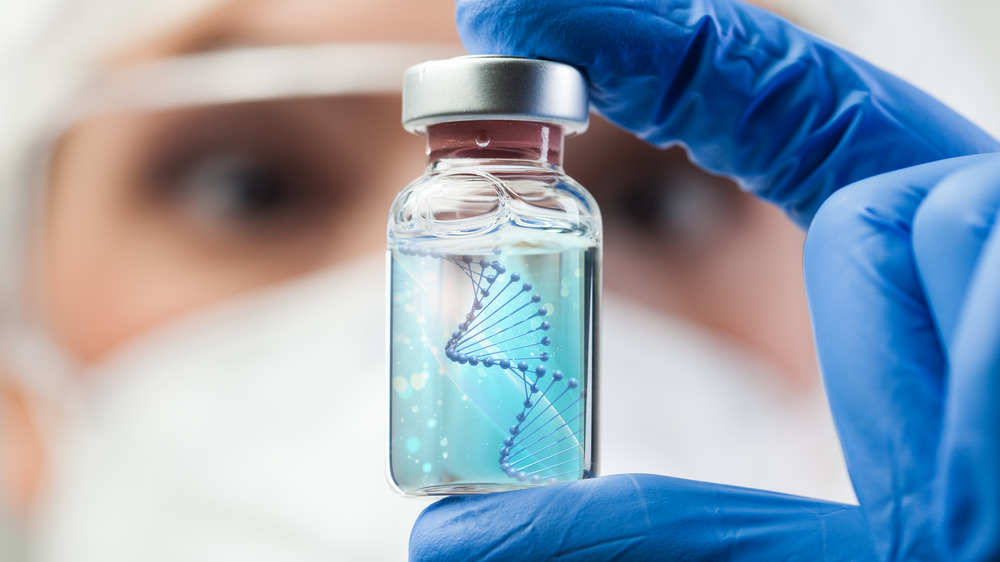Myths About The COVID-19 Vaccine You Should Stop Believing
The anti-vaccination attitude isn't new, but there's something special about the sentiment sweeping the nation at this moment in time. According to a poll conducted by PBS in March 2021, around 30% of Americans said they weren't planning to get vaccinated against COVID-19, even though COVID-19 has killed more than half a million people in the U.S. alone.
Now, if you live in a place where there are a lot of anti-vaxxers, you may think this is par for the course, but those statistics are nationwide, and nationwide anti-vaccination sentiment for regular vaccines like the MMR and the DTaP just isn't that high. In fact, according to Medical News Today, most parents do sign their kids up for childhood vaccines — around 91.5% of American kids have had the MMR, for example. So it's not like it's only anti-vaxxers who are refusing the COVID-19 shot.
So why the hesitancy? Well, besides the political undertones dividing people over the COVID-19 vaccine, there's also a lot of bad press. The vaccine is so important and such a huge undertaking that it's not really surprising that there are a lot of rumors and myths attached to it. So what's true and what's not? Here are some of the biggest COVID-19 vaccine myths, debunked.
Myth: The COVID-19 vaccines contain the cells of aborted fetuses
What better way to make the COVID-19 vaccine seem unpalatable to about 46% of the population than to say it's got something to do with abortion? But that's a myth, and the confusion is probably part people deliberately trying to make the vaccine seem evil and part people just not understanding the difference between "fetal tissue" and a "fetal line."
According to Nebraska Medicine, none of the currently available COVID-19 vaccines contain cells from aborted fetuses. But the Pfizer and Moderna vaccines were tested using fetal cell lines, and Johnson & Johnson used fetal cell lines for the design, testing, and production of their vaccine.
On its face, this may just seem like two terms for the same basic thing, but the difference is actually pretty important. Fetal tissue comes from an aborted fetus, but a cell line is grown in a laboratory. Fetal lines are descended from the cells of aborted fetuses, but the lines themselves are at least 40 years old. Even the Vatican agrees that fetal cell lines are acceptable in vaccines like the one for COVID-19, which have the potential to protect a lot of people.
Myth: You don't need to get the vaccine if you're young and healthy
COVID-19 deaths are less common in young adults than they are in older people and people with underlying medical conditions. As of mid-February, according to Heritage.org, roughly 93% of COVID-19 deaths have occurred in people over the age of 55, while only 0.2% are under the age of 25. But that doesn't mean young people are immune, or that they can't spread the virus around to others.
Most doctors agree if you're young and healthy, you should still plan to get the shot when it's your turn. That's because even rare complications can still happen, and statistics won't mean anything to you if you are one of the unlucky few who end up on a ventilator. But more importantly, young people can still pass COVID-19 along to others. In fact, according to Johns Hopkins Medicine, people under the age of 30 account for more than 20% of all COVID-19 cases, and there's a correlation between spikes in cases in this age group and subsequent spikes in older groups, which seems to suggest that young people are picking up the virus and then passing it on to older family members.
Myth: You don't need to get the vaccine if you've already had COVID-19
This seems like a no-brainer. If you have natural immunity, why would you also need vaccine immunity? But like everything in science, the answer to that question is complicated.
For starters, the Cleveland Clinic says there's really no reason not to — you're not any more likely to experience negative side effects if you have naturally acquired antibodies. But it's probably also true that the immunity you get from the vaccine may actually be better at preventing future disease. According to CNN, there have been cases of people becoming reinfected with COVID-19 after they've recovered, so natural immunity isn't perfect. Vaccines, on the other hand, can be designed to prompt a stronger immune response, so the antibodies you produce in response to a vaccine may actually do a better job of protecting you than the antibodies you produce in response to natural infection.
And there's another reason why it might be a good idea to get the vaccine even if you've already had the disease — some COVID-19 "long-haulers," people who have lingering symptoms months after they've had the illness — have reported feeling better after receiving the vaccine.
Myth: The vaccines were rushed, so that means we can't trust them
It seems like the vaccines were rushed, but they've actually been in development for decades. How can that be? Because the virus that causes COVID-19 (SARS-CoV-2) is closely related to the virus that causes SARS (SARS-CoV), and we've known about SARS-CoV since 2002.
According to a paper published in the Journal of Biomedical Science, the SARS outbreak of 2002 and the MERS outbreak that followed a decade later (MERS is also in the coronavirus family) prompted scientists to begin developing a vaccine that worked against the distinctive spike proteins that are unique to coronaviruses. So a lot of the work that was needed to complete a COVID-19 vaccine had already been done. And the mRNA technology — which both the Pfizer and Moderna vaccines use — is not new, either. According to the CDC, scientists have been experimenting with mRNA vaccines "for decades," which means producing a new mRNA vaccine is already a pretty streamlined process. So the virus itself may be new, but scientists did not have to start from scratch, and that's why we're lucky enough to have a COVID-19 vaccine today.
Myth: The vaccine hasn't been tested for safety
A typical vaccine being developed in a non-crisis world takes more than a decade to get to market. That's not because vaccine development takes a long time; it's because getting through the regulatory process takes a long time. But there's a perception that development takes a long time because of all the safety testing, which naturally has led to a perception that the fast-tracked COVID-19 vaccine must have undergone less safety testing than what's typical.
According to The New York Times, all of the COVID-19 vaccines (including the 70+ that are still in clinical trials) undergo a rigorous safety testing process, beginning with preclinical testing on animals. When that's complete, the vaccine enters phase 1 trials in a small number of humans. During phase 2, researchers give the vaccine to a few hundred people before moving into phase 3, where thousands of volunteers receive the vaccine. All the COVID-19 vaccines that are currently available have undergone all phases of safety testing, and safety monitoring is still ongoing. The vaccine did move through the process quickly, but that's only because it didn't have the wade through as much bureaucracy as other vaccines.
Myth: The vaccines are full of preservatives and/or other harmful secret ingredients
This is the same old argument you hear in vaccine-denial circles: Vaccines are full of bad stuff, and why would you choose to have bad stuff injected into your body? But the truth is that vaccine manufacturers have been very open about what's in their COVID-19 vaccines, and not only are there no secret ingredients, but the ingredients that are in the vaccines are safe.
Hackensack Meridian Health has published a complete list of ingredients for both the Pfizer vaccine and the Moderna vaccine. Both formulas contain mRNA, lipids (including polyethylene glycol), salts, and sugars. The Moderna vaccine also contains acetic acid, which is the acid that makes vinegar taste like vinegar, and acid stabilizers. There's nothing mysterious or inexplicable or dangerous.
As for preservatives, the vaccines don't contain thimerosal, and they don't contain formaldehyde or any of the other chemicals that have gotten people's hackles up in the past. There aren't any eggs, either. When people do have allergic reactions to COVID-19 vaccines, it's probably because of the polyethylene glycol — but so far allergic reactions have been really uncommon.
Myth: The COVID-19 vaccine causes way more side effects than other vaccines
All vaccines can have side effects. If you get a COVID-19 shot, you can expect to have a sore arm or — less commonly — develop a short-lived fever and some other mild side-effects like headache, fatigue, and body aches. And the side effects may be worse following the second shot. But that's not because you're becoming ill with COVID-19; it's because your body's immune system is ramping up.
The rumor that the vaccine's side effects happen "50 times more often" than side effects from the flu vaccine came from a single article that was widely shared on Facebook but was eventually flagged for misinformation. This claim is based on data obtained from a federal reporting system that records adverse reactions. Because COVID-19 vaccines are still being monitored as a part of the safety testing process, though, many more adverse reactions end up in that database compared to those that may occur after other vaccines. In other words, people are a lot less likely to report side effects from, say, a flu vaccine than they are a COVID-19 vaccine, and that makes it look like the COVID-19 vaccine causes more side-effects.
Myth: The vaccine causes infertility and miscarriage
You may have heard the expression, "correlation is not causation." This is especially important when it comes to vaccines because it can be really easy to mistakenly believe that two events are related just because they happened in the same week. Let's say you develop symptoms of diabetes two days after you flew from New York to Los Angeles. Does that mean the flight gave you diabetes? Of course not. So if you had a miscarriage two days after you received a COVID-19 vaccine, does that mean the COVID-19 vaccine caused your miscarriage?
AFP Fact Check looked into this claim and concluded that there's no causal link between any miscarriages and the COVID-19 vaccine. Miscarriage is common (occurring in 10 to 20% of pregnancies), and you would expect a few women to miscarry following a vaccination just based on statistical probability alone. The CDC told AFP Fact Check that there is currently no evidence establishing a causal relationship between the vaccine and miscarriages.
Ditto for the claim that the vaccine can cause infertility. According to AFP Fact Check, there have been no documented cases of infertility following a COVID-19 vaccination.
Myth: The vaccine's failure rate is worse than COVID-19's death rate
It's easy to misinterpret statistics. It's also easy to make statistics seem better or worse just based on how you talk about them. An 80% success rate, for example, seems pretty good, while a 1 in 5 chance of failure seems terrible, but those are the exact same numbers.
This particular myth, it turns out, was a misinterpretation of statistics. According to Reuters, social media says the vaccine is pointless since its efficacy is only 90%, while the virus's survival rate is 99%. But this isn't even the right comparison. A 90% efficacy rate does not mean 10% of those who received the COVID-19 vaccine will die from the disease. It means 10% of those who received the vaccine will still be vulnerable to getting the virus. But the vaccine can still help prevent the people who do get sick from requiring hospitalization.
That 99% number isn't accurate, either. Globally, the case fatality rate is more like 2%, which doesn't seem awful until you consider just how contagious COVID-19 is. So a low overall fatality rate is no reason to discount the value of the vaccine.
Myth: The vaccine contains a microchip
No, no, no, the vaccine does not contain a microchip. This is a rumor someone made up to discredit the vaccine (and the people who promote it). It's entirely political and it has no basis in fact. To make this rumor seem more plausible, its purveyors shared this diagram as "proof" that the COVID-19 vaccine is just a way for the government to always know where you are and what you're doing. But the diagram actually shows the plans for a guitar pedal, not a microchip (via Mashable).
FactCheck.org looked into this rumor and linked it to an interview with a medical device executive who claimed his company — ApiJect — was designing a special syringe that would contain an RFID tag. The tag wouldn't be injected along with the vaccine, though, it was simply there to guard against counterfeit vaccines and make sure the dose wasn't expired.
Incidentally, the ApiJect syringes are still just an idea and aren't even being used for the COVID-19 vaccine. And if you want to make sure the government isn't tracking you, getting rid of your cell phone is a much better strategy than shunning a life-saving vaccine.
Myth: The COVID-19 vaccine will give you COVID-19
It's easy to see where this rumor might have come from — the vaccines we're familiar with, like the MMR, chickenpox, rotavirus — containa "live-attenuated virus," which is basically just a weakened version of the virus. These vaccines can cause the recipient to develop mild symptoms of the disease, but they rarely make anyone genuinely ill. There are also vaccines like the one for rabies that are "inactivated." These also contain a virus, but it's not live.
Still, it's reasonable for people to assume that COVID-19 vaccines work the same way, so the vaccine will "give you" COVID. But the COVID-19 vaccine is a completely different technology. Both the Pfizer and Maderna vaccines are mRNA vaccines, and they contain no virus at all. Instead, the vaccine teaches your body how to produce the COVID-19 virus's distinctive "spike proteins," which are the structures the virus uses to latch onto and enter the cells in your body (via Discover). Then, your immune system learns to build antibodies against the protein. To build immunity, your body doesn't even need to encounter the virus itself, which means there's no way you can get COVID-19 from the vaccine.
Myth: The vaccines will alter your DNA
No, mRNA is not DNA. It's actually an important component of a three-part system: The DNA contains the genetic instructions for building proteins, the ribosomes actually build the proteins, but the mRNA is the guy who carries the instructions from the DNA to the ribosomes so the ribosomes know what to do. Still, any time you hear the word "genetic" it can have some scary undertones, so it's easy to see why some people think the COVID-19 vaccine might actually do scary things to your DNA.
According to HealthFeedback.org, the mRNA contained in the COVID-19 vaccine never goes anywhere near your cell's DNA. It's only there to provide the instructions on how to make the spike protein. After your cells make the protein, they actually destroy the instructions, so you don't even have to worry that your out-of-print spike protein instruction book will be floating around in your body forever and ever. Then, the protein itself gets sent to the surface of your cells, where your immune system finds it and goes, "Hey! That's not supposed to be there." That's when it creates the antibodies, thus generating immunity.
Myth: You can say goodbye to masks and social distancing immediately after being vaccinated
It's safe to say we've all grown tired of our most popular pandemic fashion accessory: the mask. Unfortunately, though, you don't get to tear it off, toss it in the nearest bonfire, and then hug a stranger moments after you've gotten your COVID-19 shot. According to NPR, you won't even have 50% immunity until a few weeks after your first shot, and you won't reach that coveted 95% immunity until a week after your second shot.
The Centers for Disease Control and Prevention considers people to be "fully vaccinated" two weeks after their second dose of the Moderna or Pfizer COVID-19 vaccine or two weeks after the single-dose Johnson & Johnson vaccine. Additionally, the CDC asserts that fully vaccinated people are able to "resume activities without wearing a mask or physically distancing, except where required by federal, state, local, tribal, or territorial laws, rules, and regulations, including local business and workplace guidance."
